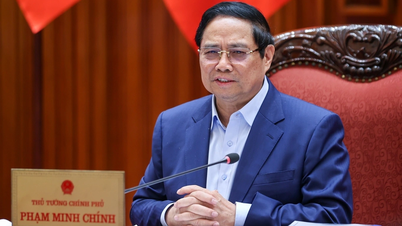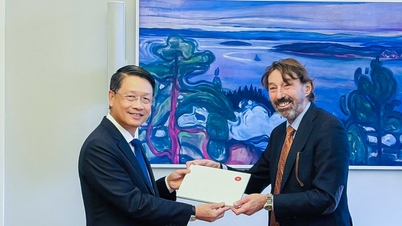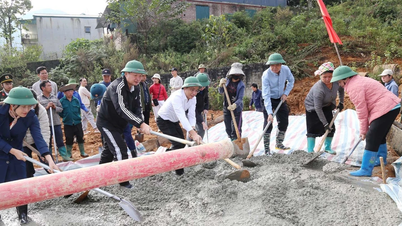Ministers must be directly responsible for legal work, this was emphasized by Minister of Justice Le Thanh Long when answering the issue of overcoming incomplete law-making proposals.

On the morning of August 22, the National Assembly Standing Committee continued its 36th session with the question-and-answer session on the second group of issues, related to the fields of: Justice; security, order, and social safety; internal affairs; inspection; court; and prosecution.
Overcoming the problem of adding many bills to the agenda close to the session
Ministers must be directly responsible for legal work, this was emphasized by Deputy Prime Minister and Minister of Justice Le Thanh Long when answering delegate Pham Van Hoa (Dong Thap) about the problem of overcoming the dossiers of law-making proposals that do not ensure quality; the submission of dossiers late, not ensuring time; adding many law projects to the agenda close to the session, causing many difficulties for research and examination work.
Stating the numbers, Deputy Prime Minister and Minister of Justice Le Thanh Long said that in 2021, 10 draft laws were initially submitted to the program, then 11 draft laws were added, this is the first year of the term.
By 2022, the initial submission was 11, then 13 were added (to 24 projects). In 2023, the initial submission was 14, then 12 were added (to 26 projects). In 2024, the initial submission was 16 projects, including projects submitted to the National Assembly for the first or second hearing for consideration and approval. This year, if approved by the National Assembly, the number of bills will likely increase to 34. Thus, the number of changes is very large.
According to the Deputy Prime Minister, 2021 will be a year of careful consideration for the entire term and at the same time, orientation will be given to the development of a law and ordinance program along with additional elements. By 2022, it will be “the peak time to come up with solutions to address issues related to COVID-19,” identify immediate solutions to address them, and at the same time implement the socio-economic recovery and development program, so it will take time.
Explaining the proposal to add to the program so close to the session, the Deputy Prime Minister and Minister of Justice said that this was due to a number of specific policy resolutions for localities and a number of measures that the National Assembly immediately approved to implement the socio-economic recovery program.
There are two reasons, firstly, the socio-economic situation is changing very rapidly. Secondly, our ability to grasp the situation in advance is still difficult; we have to deal with practical problems that our ability to recognize in some cases is still confused.
Referring to the solutions, the Deputy Prime Minister emphasized first the factors of discipline and order, and the need to be more proactive. Ministers must be directly responsible for legal work and must proactively do the assigned tasks. Next is to improve the quality of human resources.
“Especially in the current context, human resources are a fundamental problem. If we cannot forecast the situation, do not have information, and do not have a strong enough human resource, it will be very difficult. If we do not overcome this, we will continue to face difficulties,” said the Deputy Prime Minister.
Along with that, we will consider amending and supplementing the law on promulgating legal documents. Wherever it is possible to loosen the rules and strengthen discipline, we will try to handle it.
Regarding this content, Vice Chairman of the National Assembly Nguyen Khac Dinh said that in the field of law-making in general, the National Assembly Standing Committee is proactively coordinating with the Government to prepare to organize the first forum on law-making, expected to be held in early 2025.
The Vice Chairman of the National Assembly explained that the program content is less predictable and often overloaded due to the constantly changing situation and tasks. New situations, new tasks, new requirements, and new developments give rise to new problems, so it is natural to have to make frequent adjustments, but how to make adjustments effectively?
The law just came into effect and had to be amended.
Continuing to question this content, delegate Nguyen Phuong Thuy (Hanoi) informed that recently, the press has continuously reported that the Government is urgently directing the drafting of draft laws to amend 13 laws with problems and inadequacies and will propose that the National Assembly immediately approve them at the upcoming 8th Session.

National Assembly deputies and voters are very curious as to why there has been a direction for the law-making program since the beginning of the term, and why the work of reviewing laws has also been done relatively regularly.
The entire apparatus of the Government and the National Assembly agencies are very dedicated, responsible, and work very hard, but the law has just been implemented and has to be amended, and even the law that has not been implemented has to be amended. Many localities, projects, and programs do not want to apply the provisions of the law but instead require special mechanisms and policies that are different from the law.
“So, I would like to ask the Deputy Prime Minister to explain the reasons for these things, the Government's responsibility in constantly amending laws, and how to balance the unity and stability of the legal system with special and timely requirements,” the female delegate from Hanoi questioned.
Responding to delegates, the Deputy Prime Minister and Minister of Justice said that previously, in the first year of the term, the National Assembly approved the law and ordinance building program for the first year and the entire term. Later, when amending and supplementing the law and assessing the reality, it was found that it was not feasible.
Many times by the third year, the last year of the term, “there is almost no trace of the original project we put in. In fact, to be honest, many times we just do it to get it done and do not fully comply with the procedures prescribed for issuing legal documents.”
In this term, following the initiative of the National Assembly, the Government has also made a very important contribution in building the orientation of the law and ordinance building program for the term. The Politburo issued Conclusion 19 and the National Assembly Standing Committee issued Plan 81.
Initially, 106 draft laws and ordinances were included in the program, and according to the Government's preliminary assessment, up to now, about 80% have been implemented or submitted to the National Assembly for consideration and approval, or have been and are in the program and are expected to be submitted.
However, 17 new projects have recently been added to this program orientation. “Even these 17 new projects cannot handle all the things that we want to handle due to the reality,” the Deputy Prime Minister said.
According to him, the Government and the Prime Minister continue to establish a review team and a Steering Committee to review and synthesize from different sources and plan to submit to the National Assembly for consideration and approval of two laws amending and supplementing different laws.
It is expected to amend and supplement the Investment Law, Public Investment Law, Public-Private Partnership Investment Law (PPP), Enterprise Law, Planning Law and Law amending and supplementing a number of articles of 37 related laws to implement the Planning Law.
The second group is the State Budget Law, Tax Administration Law, Public Asset Management and Use Law, Accounting Law, National Reserve Law, Independent Audit Law and Securities Law.
“The first reason is due to practical requirements and solutions to handle, contributing to socio-economic development. The second is subjective in that we have not fully understood,” stating the reason for amending the laws, the Deputy Prime Minister cited that when submitting the draft laws, there were expert opinions that the investment laws should be merged together.
The State Budget Law, two terms ago, when we implemented the constitutional principle that the central budget plays a leading role...
Previously, our doctrine was like that, but now the situation has changed, “there are problems we are dealing with that are actually a little different from our original concept,” that is why there must be adjustments.
The Deputy Prime Minister also admitted that the subjective cause was the lack of initiative of ministries and branches./.
Source: https://baolangson.vn/cac-bo-truong-phai-truc-tiep-phu-trach-cong-tac-phap-che-5019230.html





![[Photo] Panorama of the 2025 Community Action Awards Final Round](https://vphoto.vietnam.vn/thumb/1200x675/vietnam/resource/IMAGE/2025/11/15/1763206932975_chi-7868-jpg.webp)
![[Photo] General Secretary To Lam receives Vice President of Luxshare-ICT Group (China)](https://vphoto.vietnam.vn/thumb/1200x675/vietnam/resource/IMAGE/2025/11/15/1763211137119_a1-bnd-7809-8939-jpg.webp)
![[Photo] Prime Minister Pham Minh Chinh meets with representatives of outstanding teachers](https://vphoto.vietnam.vn/thumb/1200x675/vietnam/resource/IMAGE/2025/11/15/1763215934276_dsc-0578-jpg.webp)

































































































Comment (0)